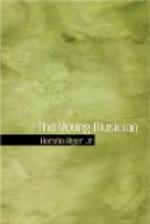“You are very kind,” said Philip. “Henry, we may as well lay down again.”
Henry obeyed directions, but he was not altogether free from alarm. He had read that the Indians are very crafty. How did he know but their copper-colored host might get up in the night, skillfully remove their scalps, and leave them in a very uncomfortable plight?
“Hadn’t we better get up, and run away as soon as he is asleep?” he whispered to Philip.
“No; he’s friendly,” answered Philip confidently.
As Henry had read about friendly Indians—all he knew about Indians, by the way, was derived from reading stories written by authors little wiser than himself—he concluded that perhaps there was nothing to fear, and after a while fell asleep again.
When the boys awoke it was morning. They looked toward the corner where the Indian had lain down, but it was vacant.
“He’s gone.” said Henry, rather relieved.
“You were pretty well frightened last night,” said Philip, smiling.
“Who wouldn’t be!” asked Henry; “to wake up and see a big Indian in the room?”
“I dare say many boys would be frightened,” said Philip, “but I don’t think a boy who left home to go out West to kill Indians ought to be afraid of one.”
“I guess I’ll give up going,” said Henry, rather abashed.
“I think myself it would be as well,” observed Philip quietly. “You’d find it rather serious business if you should meet any real Indian warriors.”
“I don’t know but I should,” Henry admitted, rather awkwardly. “I didn’t think much about it when I left home.”
“I suppose you thought you’d be a match for half a dozen Indian warriors?” said Philip, laughing.
“That was the way with ‘Bully Bill’; or, ‘The Hero of the Plains,’” said Henry. “He always came off best when he fought with the Indians.”
“I don’t think either you or I will ever prove a Bully Bill,” said Philip. “I might enjoy going out West some time, but I shouldn’t expect to kill many Indians. I think they would stand a good deal better chance of shooting me.”
Henry said nothing, but looked thoughtful. His romantic ideas seemed to have received a sudden shock, and he was trying to adjust his ideas to the new light he had received.
The boys were preparing to go out, when their Indian host suddenly reappeared. He carried in his hand a large-sized loaf of baker’s bread, which he had procured at the village store. He was alive to the duties of hospitality, and did not intend to let his guests go, uninvited though they were, without a breakfast.
Though his stock of English was limited, he made out to invite the boys to breakfast with him.
Henry would have preferred to go to the hotel, but Philip signed to him to accept graciously the Indian’s hospitality.
As the bread was fresh, they partook of it with relish, washing it down with drafts of clear spring water.




